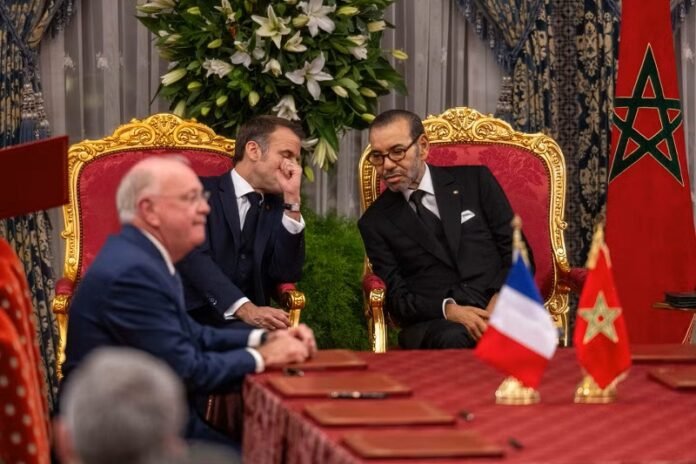In the contemporary media landscape, symbolic images and visual scenes sometimes convey more than actual events, prompting some newspapers to reinterpret national narratives according to their own perceptions. Among these attempts is the French newspaper Le Monde’s series of articles, specifically the fourth installment of Summer 2025 titled “Mohammed VI, the King of Grand Diplomatic Maneuvers”, which portrayed the Moroccan king in arguably exaggerated dimensions.
A close analysis of events shows that despite the article’s elaborate descriptions, it fails to convey the essence of royal policy or its substantial impact domestically or internationally. The contrast between the lavish reception of French President Emmanuel Macron on October 28, 2024, and the king’s involvement in sensitive matters like the Moroccan Sahara issue and rapprochement with Israel is not a sign of weakness but evidence of the king’s ability to use diplomacy as a strategic tool to serve national interests and protect Moroccan sovereignty.
The King on the International Stage: Strategic Approach and Tangible Results
On October 28, 2024, the king received Emmanuel Macron at a grand official ceremony featuring red carpets, orchestras, and horsemen in national colors. While international media emphasized this as a symbol of opulence, it was in reality part of a meticulously planned diplomatic strategy that led France to recognize Morocco’s sovereignty over Western Sahara.
A deeper analysis shows this was no coincidence: three years of continuous diplomatic pressure, including freezing official relations, suspending strategic cooperation, and coordinated media campaigns, successfully rebalanced the relationship with Paris in favor of Moroccan interests. The key lesson: true leadership requires patience and long-term planning, not just images or grand celebrations.
Additionally, under the king’s supervision, Morocco launched several international initiatives: strengthening economic cooperation with the European Union, signing partnership agreements with African countries, and actively participating in food and climate security conferences. These actions demonstrate that the king’s role extends beyond sensitive political files, enhancing Morocco’s standing as a balanced international actor capable of protecting its interests.
National vs. International Media: Divergent Perspectives and Analytical Depth
Comparing national and international coverage reveals a stark difference. National media highlight the tangible results of royal policy: French recognition of Moroccan sovereignty over the Sahara, reinforcing Morocco’s position in North Africa and the Mediterranean, and safeguarding citizens’ interests in the economy and development.
In contrast, international media like Le Monde focus on symbolism, opulence, and appearances, linking them to hypothetical attempts to create a narrative of “end of reign” or “king’s decline.” This raises critical questions:
-
Why do foreign media reduce Moroccan politics to superficial scenes?
-
How can Moroccan citizens distinguish concrete achievements from manufactured media narratives?
-
What role does national journalism play in protecting collective awareness from misleading impressions?
The King and National Interests: From Vision to Achievement
Mohammed VI did not limit himself to dealings with France; he expanded strategic alliances with Israel, African countries, the EU, and the US, leveraging economic, security, and migration files to enhance Morocco’s influence and position.
This diplomacy is not mere protocol; it protects national interests, ensures internal stability, and promotes economic and social development, including in remote regions. Concrete examples include:
-
Signing trade and investment agreements with European countries to develop renewable energy.
-
Launching infrastructure projects in southern Morocco to foster regional development.
-
Supporting social programs for vulnerable populations to ensure societal stability.
These steps reflect a comprehensive strategy integrating diplomacy, internal governance, and socio-economic development.
Domestic and International Implications
-
Domestically: Strengthening institutional trust, supporting the national economy, developing remote regions, and opening international cooperation while protecting citizens’ interests.
-
Internationally: Elevating Morocco’s status in global forums, establishing it as an influential actor capable of rebalancing situations in favor of national interests.
Citizen Journalism: Linking Achievements to Citizens’ Interests
Citizen journalism emphasizes presenting national issues in a way that allows citizens to understand the link between policy, diplomacy, and their daily lives:
-
Citizens see Morocco’s international advancement directly affecting investment and job creation.
-
Following socio-economic development programs, citizens realize the tangible benefits of royal diplomacy on living standards.
-
Citizens become partners in evaluating policies, asking critical questions about outcomes and effectiveness.
Conclusion: Stability and Confidence
Ultimately, the truth is clear: Morocco is strong, its king is present, and its people maintain confidence in their leadership. History is not written in flashy articles but in tangible achievements that ensure national continuity and protect citizens’ interests. Mohammed VI has transformed diplomacy into a tool to confront challenges and safeguard Moroccan sovereignty, balancing internal and external interests, present and future.




